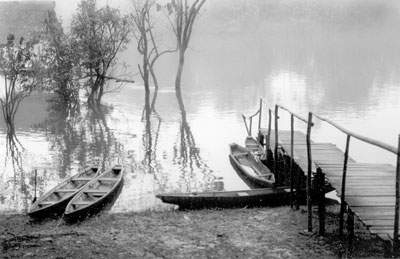Peru's Tahuayo Lodge
I took a delightful 2-week trip to Peru with Amazonia Expeditions (10305 Riverburn Dr., Tampa, FL 33647; phone 800/262-9669) in March ’04, staying at the Tahuayo Lodge. The cost, including airfare from Denver, one night in Lima, transfers and meals, was $2,795 plus $37 Peruvian taxes.
I arrived at the lodge after a 4-hour trip upriver from Iquitos, the last large city on the river, some 2,500 miles from the Atlantic Ocean. When we docked in front of the lodge, I began to question the wisdom of my choice, as it appeared to be a ramshackle collection of palm-thatched wooden buildings perched on 14-foot stilts.
After a brief tour, I was even more dismayed to find that there was no electricity, generated or otherwise, and all activities before 6 a.m. and after 6 p.m. occurred by the light of kerosene lanterns. Since I had no choice, I stayed — and after about 36 hours of mental and physical adjustments, I found I was enjoying myself immensely.
The lodge had a staff of about 20, including guides, boat drivers, cooks, helpers and housekeeping staff. The 15 cabins could accommodate about 40 guests.
The six guides all spoke English plus several other languages. There were three motorboats and at least four dugout canoes available. Each morning and evening we were presented with a list of activities, among which were bird and wildlife watching by canoe or on foot, a canopy zip line, survival training in the jungle, swimming with dolphins, visits to indigenous villages and more.
March is mid-water season; highest water arrives in May, so we were able to walk around much of the grounds. It rained frequently and heavily, but activities went forward with just a little reshuffling. We were supplied with surprisingly comfortable rubber gum boots.
The food was an abundance of vegetables, fruit, fish, chicken and some beef. I almost, but not quite, satisfied my craving for mangoes. Peruvians love their beets, and we had them prepared many ways. The cooks prepared all the fish we caught; fish and chicken dishes were exceptionally good. Beer and soft drinks were available for an extra charge.
Our laundry was done for us.
Of course, it was buggy and hot, humid and wet, but the nights were cool enough for sleeping and there were very few bugs inside the lodge. Deet™ did the trick for hiking and canoeing, and if a creature got through my defenses I used an anti-itch cream. The drinking water supplied was safe, although the cold shower water came straight from the nearby Tahuayo River. There were two shared toilets and showers for each six rooms. There has been no malaria or dengue fever in the area for 19 years.
My guide, Llyakco (Jocko), a full-blooded Omagua Indian, was extraordinary. He sang John Denver songs, painted exquisite birds and animals and seemed to know everything about the rainforest. He contributed so much to my enjoyment of the trip. I didn’t see as many animals as I had hoped to, but there were many birds, including the weird and wonderful hoatzin and the wire-tailed manakin.
Paul and Dolly Beaver, owners of Amazonia Expeditions, care deeply about the rainforest environment and contribute in many ways to the schools and villages near the lodge.
My only mild criticism was of Amazonia Expeditions’ choice of hotel in Lima, the Melodia (Ave. la Marina 2247, Lima, Peru; phone 800/359-5672). The staff was delightful, but the noise was terrible. Fortunately, my stay was for only four hours.
I wouldn’t recommend this trip to anyone who dislikes heat, humidity, frequent rain, bugs, cold water showers or light from a kerosene lantern. For those who don’t mind somewhat primitive conditions, Amazonia Expeditions’ Tahuayo Lodge offers an excellent, in-depth introduction to the rainforest. While my stay was for two weeks, I think 10 days would have been enough.
With no radio, TV, cell phones, telephones or newspapers, it was a perfect getaway from the sad distractions of our modern world.
ELLEN G. JACOBSON
Littleton, CO



